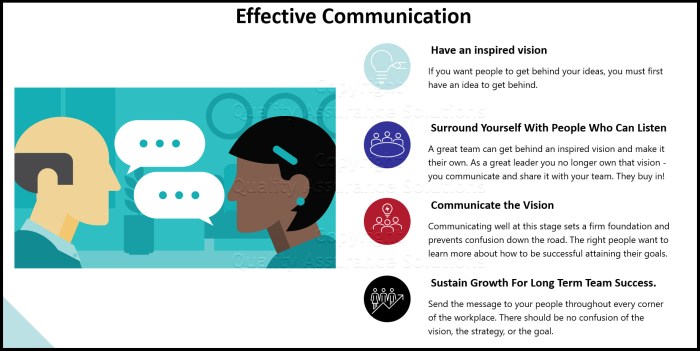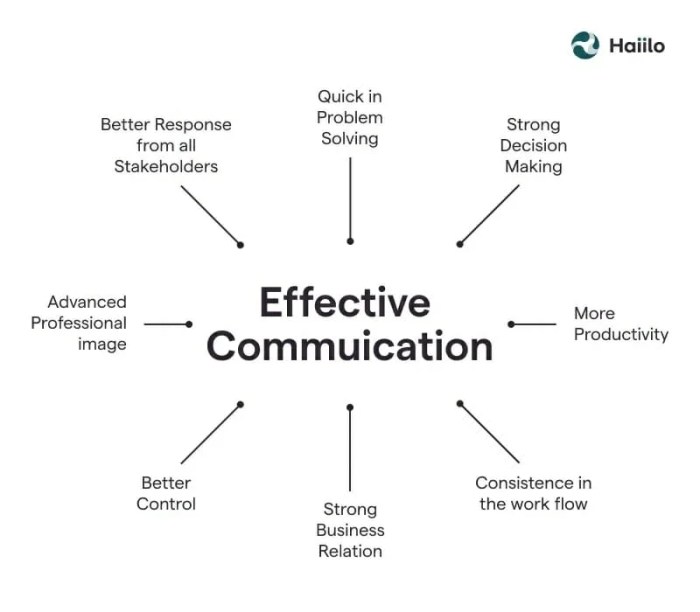Effective Communication Skills takes center stage, inviting readers into a world where the right words can make all the difference. From personal to professional settings, the ability to communicate effectively is key to success.
In this guide, we’ll explore the different types of communication skills, strategies for improvement, and how to overcome common barriers, all with an engaging twist that keeps you hooked.
Importance of Effective Communication Skills
Effective communication skills are essential in both personal and professional settings. In personal relationships, they help build trust, foster understanding, and resolve conflicts. In professional environments, these skills are crucial for successful collaborations, clear instructions, and effective teamwork.
Improved Relationships and Collaborations
Effective communication skills can lead to better relationships by enhancing interpersonal connections, promoting empathy, and encouraging open dialogue. For example, active listening, clear articulation of thoughts, and nonverbal cues like eye contact can create a positive atmosphere and strengthen bonds between individuals.
- Active Listening: Being fully present and engaged in conversations shows respect and helps avoid misunderstandings.
- Clear Articulation: Expressing thoughts and ideas clearly helps ensure that messages are accurately conveyed and understood by others.
- Nonverbal Cues: Body language, facial expressions, and tone of voice can convey emotions and intentions, adding depth to communication exchanges.
Impact of Poor Communication Skills
On the other hand, poor communication skills can lead to misunderstandings, conflicts, and strained relationships. Misinterpretations, lack of clarity, and ineffective listening can create barriers to effective communication, resulting in frustration, resentment, and unproductive interactions.
- Misinterpretations: Ambiguity and vague communication can lead to misinterpretations, causing confusion and discord among individuals.
- Lack of Clarity: Unclear messages or incomplete information can result in misconceptions and errors, affecting productivity and efficiency.
- Ineffective Listening: Ignoring verbal and nonverbal cues, interrupting others, or failing to acknowledge emotions can hinder effective communication and diminish trust.
Types of Effective Communication Skills
Effective communication skills encompass various types, including verbal, non-verbal, written, and active listening. Each type plays a crucial role in different contexts, contributing to successful interactions and relationships.
Verbal Communication
Verbal communication involves the use of spoken words to convey messages. It is essential in face-to-face interactions, presentations, meetings, and phone calls. Clear articulation, tone, and language choice are key factors in effective verbal communication.
Non-Verbal Communication
Non-verbal communication consists of gestures, facial expressions, body language, and eye contact. It complements verbal communication and can convey emotions, intentions, and attitudes. In situations where words may be unclear, non-verbal cues play a significant role in understanding.
Written Communication
Written communication includes emails, reports, memos, and text messages. It is crucial for conveying detailed information, documenting conversations, and maintaining records. Clarity, conciseness, and proper grammar are essential for effective written communication.
Active Listening
Active listening involves fully concentrating, understanding, responding, and remembering what is being said in a conversation. It shows respect, builds trust, and fosters better relationships. Active listening is vital in counseling sessions, conflict resolution, and leadership roles.
Developing Effective Communication Skills

Effective communication is a crucial skill that can be developed and improved over time. By focusing on various aspects of communication, individuals can enhance their ability to convey messages clearly and effectively. Here are some strategies for developing different types of communication skills:
Improving Verbal Communication Skills
Verbal communication involves the use of words to convey messages. To improve verbal communication skills, individuals can focus on:
- Clarity: Ensure that your message is clear and easy to understand by using simple language and avoiding jargon.
- Tone: Pay attention to your tone of voice, as it can affect how your message is perceived. Use a friendly and respectful tone to create a positive interaction.
- Active Listening: Practice active listening by focusing on the speaker, asking clarifying questions, and summarizing key points to show that you are engaged in the conversation.
Enhancing Non-Verbal Communication
Non-verbal communication involves body language, facial expressions, and gestures that can convey messages without words. To enhance non-verbal communication:
- Body Language: Pay attention to your posture, gestures, and eye contact to convey confidence and openness.
- Facial Expressions: Use facial expressions to show emotions and reinforce your verbal message.
Tips for Enhancing Written Communication Skills
Written communication is essential in various settings, including emails, reports, and presentations. To improve written communication skills:
- Proper Grammar: Use correct grammar, punctuation, and spelling to ensure clarity and professionalism in written messages.
- Structure: Organize your written content in a logical and coherent manner to help readers follow your ideas easily.
- Tone: Adapt your writing style to the audience and purpose of the message, whether formal, informal, persuasive, or informative.
Barriers to Effective Communication: Effective Communication Skills

Effective communication can be hindered by various barriers that prevent clear and accurate message transmission. These barriers can include factors such as language barriers, distractions, lack of feedback, and cultural differences. It is important to identify these barriers in order to overcome them and ensure effective communication in all aspects of life.
Language Barriers, Effective Communication Skills
Language barriers can arise when individuals do not share a common language or have difficulty understanding each other’s accents or dialects. To overcome language barriers, it is essential to use simple and clear language, avoid jargon or technical terms, and make use of visual aids or gestures to aid understanding. In cases where language differences persist, the use of translators or interpreters can help bridge the communication gap.
Distractions
Distractions such as noise, interruptions, or multitasking can disrupt effective communication by diverting attention away from the message being conveyed. To combat distractions, it is important to choose a quiet and conducive environment for communication, eliminate background noise, and maintain focus on the conversation at hand. Setting aside dedicated time for communication without any interruptions can also help improve clarity and understanding.
Lack of Feedback
A lack of feedback during communication can hinder the ability to ensure that the message has been understood correctly. To overcome this barrier, it is crucial to encourage active listening and ask for feedback or clarification to confirm understanding. Providing opportunities for open and honest communication, as well as actively seeking feedback from all parties involved, can help address any potential misunderstandings and improve overall communication effectiveness.
Cultural Differences
Cultural differences can pose significant barriers to effective communication due to varying norms, values, and communication styles across different cultures. To address cultural differences, it is important to approach communication with sensitivity and respect for diverse perspectives. Building cultural awareness, adapting communication styles to accommodate different cultural norms, and seeking to understand and appreciate cultural differences can help bridge the gap and enhance cross-cultural communication effectiveness.
